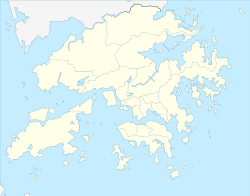Argyle Street Camp was a Japanese World War II prisoner-of-war camp in Kowloon, Hong Kong, which primarily held officer prisoners.
| Argyle Street Camp | |
|---|---|
| Kowloon, Hong Kong in China | |
| Coordinates | 22°19′30″N 114°11′05″E / 22.3251°N 114.1848°E |
| Type | Prisoner-of-war camp |
| Site information | |
| Condition | Abandoned |
| Site history | |
| Built for | Refugees |
World War II
editBuilt by the Hong Kong government as a refugee camp before the war as North Point Camp and Ma Tau Chung Camp,[1] it began life as a POW camp soon after Kowloon and the New Territories were abandoned to the Japanese.
In January 1942 it was emptied, with the POWs moving to Shamshuipo, North Point, and Ma Tau Chung Camps. However, after a number of escapes by POW officers and other ranks from Shamshuipo, Argyle Street was re-opened in mid-1942 as an officers' camp. In 1944 the officers were moved instead to Camp 'N' at Shamshuipo, and the Indian POWs from Ma Tau Chung Camp took up residence.[citation needed]
After World War II
editAfter the Japanese surrender, Argyle Street Camp became a centre for displaced people returning to Hong Kong. Later still, it was a camp for refugees reaching Hong Kong from other parts of South East Asia. The camp started accommodating Vietnamese refugees in June 1979, with a planned capacity of 20,000.[2]
Today there are no memorials of any kind on the site of the camp, which is just to the south of St Teresa's Hospital.
See also
editReferences
edit- ^ Antiquities Advisory Board. List of Internment Camps in Hong Kong during the Japanese Occupation (1941 – 1945) Archived 18 September 2021 at the Wayback Machine
- ^ "500 move to Tuen Mun" (PDF). South China Morning Post. Hong Kong. 5 June 1979. Archived (PDF) from the original on 10 April 2008.
Further reading
edit- Roland, Charles G. (2001). Long Night's Journey Into Day: Prisoners of War in Hong Kong and Japan, 1941-1945. Wilfrid Laurier University Press. ISBN 0-88920-362-8.
- Banham, Tony (2009). We Shall Suffer There: Hong Kong's Defenders Imprisoned, 1942-1945. Hong Kong University Press. ISBN 978-962-209-960-9.
